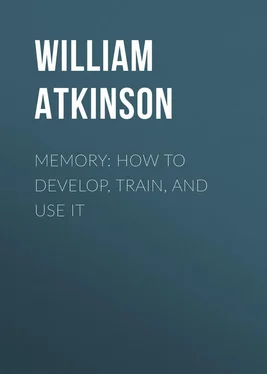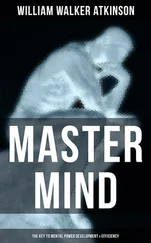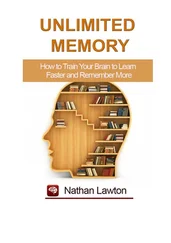William Atkinson - Memory - How to Develop, Train, and Use It
Здесь есть возможность читать онлайн «William Atkinson - Memory - How to Develop, Train, and Use It» — ознакомительный отрывок электронной книги совершенно бесплатно, а после прочтения отрывка купить полную версию. В некоторых случаях можно слушать аудио, скачать через торрент в формате fb2 и присутствует краткое содержание. ISBN: , Жанр: foreign_antique, foreign_prose, на английском языке. Описание произведения, (предисловие) а так же отзывы посетителей доступны на портале библиотеки ЛибКат.
- Название:Memory: How to Develop, Train, and Use It
- Автор:
- Жанр:
- Год:неизвестен
- ISBN:http://www.gutenberg.org/ebooks/41478
- Рейтинг книги:5 / 5. Голосов: 1
-
Избранное:Добавить в избранное
- Отзывы:
-
Ваша оценка:
- 100
- 1
- 2
- 3
- 4
- 5
Memory: How to Develop, Train, and Use It: краткое содержание, описание и аннотация
Предлагаем к чтению аннотацию, описание, краткое содержание или предисловие (зависит от того, что написал сам автор книги «Memory: How to Develop, Train, and Use It»). Если вы не нашли необходимую информацию о книге — напишите в комментариях, мы постараемся отыскать её.
Memory: How to Develop, Train, and Use It — читать онлайн ознакомительный отрывок
Ниже представлен текст книги, разбитый по страницам. Система сохранения места последней прочитанной страницы, позволяет с удобством читать онлайн бесплатно книгу «Memory: How to Develop, Train, and Use It», без необходимости каждый раз заново искать на чём Вы остановились. Поставьте закладку, и сможете в любой момент перейти на страницу, на которой закончили чтение.
Интервал:
Закладка:
It has long been recognized that the memory, in all of its phases, is capable of development, culture, training and guidance through intelligent exercise. Like any other faculty of mind, or physical part, muscle or limb, it may be improved and strengthened. But until recent years, the entire efforts of these memory-developers were directed to the strengthening of that phase of the memory known as "recollection," which, you will remember, Locke defined as an idea or impression "sought after by the mind, and with pain and endeavor found, and brought again into view." The New Psychology goes much further than this. While pointing out the most improved and scientific methods for "re-collecting" the impressions and ideas of the memory, it also instructs the student in the use of the proper methods whereby the memory may be stored with clear and distinct impressions which will, thereafter, flow naturally and involuntarily into the field of consciousness when the mind is thinking upon the associated subject or line of thought; and which may also be "re-collected" by a voluntary effort with far less expenditure of energy than under the old methods and systems.
You will see this idea carried out in detail, as we progress with the various stages of the subject, in this work. You will see that the first thing to do is to find something to remember ; then to impress that thing clearly and distinctly upon the receptive tablets of the memory; then to exercise the remembrance in the direction of bringing out the stored-away facts of the memory; then to acquire the scientific methods of recollecting special items of memory that may be necessary at some special time. This is the natural method in memory cultivation, as opposed to the artificial systems that you will find mentioned in another chapter. It is not only development of the memory, but also development of the mind itself in several of its regions and phases of activity. It is not merely a method of recollecting, but also a method of correct seeing, thinking and remembering. This method recognizes the truth of the verse of the poet, Pope, who said: "Remembrance and reflection how allied! What thin partitions sense from thought divide!"
CHAPTER II
CULTIVATION OF THE MEMORY
This book is written with the fundamental intention and idea of pointing out a rational and workable method whereby the memory may be developed, trained and cultivated. Many persons seem to be under the impression that memories are bestowed by nature, in a fixed degree or possibilities, and that little more can be done for them – in short, that memories are born, not made. But the fallacy of any such idea is demonstrated by the investigations and experiments of all the leading authorities, as well as by the results obtained by persons who have developed and cultivated their own memories by individual effort without the assistance of an instructor. But all such improvement, to be real, must be along certain natural lines and in accordance with the well established laws of psychology, instead of along artificial lines and in defiance of psychological principles. Cultivation of the memory is a far different thing from "trick memory," or feats of mental legerdemain if the term is permissible.
Kay says: "That the memory is capable of indefinite improvement, there can be no manner of doubt; but with regard to the means by which this improvement is to be effected mankind are still greatly in ignorance." Dr. Noah Porter says: "The natural as opposed to the artificial memory depends on the relations of sense and the relations of thought, – the spontaneous memory of the eye and the ear availing itself of the obvious conjunctions of objects which are furnished by space and time, and the rational memory of those higher combinations which the rational faculties superinduce upon those lower. The artificial memory proposes to substitute for the natural and necessary relations under which all objects must present and arrange themselves, an entirely new set of relations that are purely arbitrary and mechanical, which excite little or no other interest than that they are to aid us in remembering. It follows that if the mind tasks itself to the special effort of considering objects under these artificial relations, it will give less attention to those which have a direct and legitimate interest for itself." Granville says: "The defects of most methods which have been devised and employed for improving the memory, lies in the fact that while they serve to impress particular subjects on the mind, they do not render the memory, as a whole, ready or attentive." Fuller says: "Surely an art of memory may be made more destructive to natural memory than spectacles are to eyes." These opinions of the best authorities might be multiplied indefinitely – the consensus of the best opinion is decidedly against the artificial systems, and in favor of the natural ones.
Natural systems of memory culture are based upon the fundamental conception so well expressed by Helvetius, several centuries ago, when he said: "The extent of the memory depends, first, on the daily use we make of it; secondly, upon the attention with which we consider the objects we would impress upon it; and, thirdly, upon the order in which we range our ideas." This then is the list of the three essentials in the cultivation of the memory: (1) Use and exercise; review and practice; (2) Attention and Interest; and (3) Intelligent Association.
You will find that in the several chapters of this book dealing with the various phases of memory, we urge, first, last, and all the time, the importance of the use and employment of the memory, in the way of employment, exercise, practice and review work. Like any other mental faculty, or physical function, the memory will tend to atrophy by disuse, and increase, strengthen and develop by rational exercise and employment within the bounds of moderation. You develop a muscle by exercise; you train any special faculty of the mind in the same way; and you must pursue the same method in the case of the memory, if you would develop it. Nature's laws are constant, and bear a close analogy to each other. You will also notice the great stress that we lay upon the use of the faculty of attention, accompanied by interest. By attention you acquire the impressions that you file away in your mental record-file of memory. And the degree of attention regulates the depth, clearness and strength of the impression. Without a good record, you cannot expect to obtain a good reproduction of it. A poor phonographic record results in a poor reproduction, and the rule applies in the case of the memory as well. You will also notice that we explain the laws of association, and the principles which govern the subject, as well as the methods whereby the proper associations may be made. Every association that you weld to an idea or an impression, serves as a cross-reference in the index, whereby the thing is found by remembrance or recollection when it is needed. We call your attention to the fact that one's entire education depends for its efficiency upon this law of association. It is a most important feature in the rational cultivation of the memory, while at the same time being the bane of the artificial systems. Natural associations educate, while artificial ones tend to weaken the powers of the mind, if carried to any great length.
There is no Royal Road to Memory. The cultivation of the memory depends upon the practice along certain scientific lines according to well established psychological laws. Those who hope for a sure "short cut" will be disappointed, for none such exists. As Halleck says: "The student ought not to be disappointed to find that memory is no exception to the rule of improvement by proper methodical and long continued exercise. There is no royal road, no short cut, to the improvement of either mind or muscle. But the student who follows the rules which psychology has laid down may know that he is walking in the shortest path, and not wandering aimlessly about. Using these rules, he will advance much faster than those without chart, compass, or pilot. He will find mnemonics of extremely limited use. Improvement comes by orderly steps. Methods that dazzle at first sight never give solid results."
Читать дальшеИнтервал:
Закладка:
Похожие книги на «Memory: How to Develop, Train, and Use It»
Представляем Вашему вниманию похожие книги на «Memory: How to Develop, Train, and Use It» списком для выбора. Мы отобрали схожую по названию и смыслу литературу в надежде предоставить читателям больше вариантов отыскать новые, интересные, ещё непрочитанные произведения.
Обсуждение, отзывы о книге «Memory: How to Develop, Train, and Use It» и просто собственные мнения читателей. Оставьте ваши комментарии, напишите, что Вы думаете о произведении, его смысле или главных героях. Укажите что конкретно понравилось, а что нет, и почему Вы так считаете.












